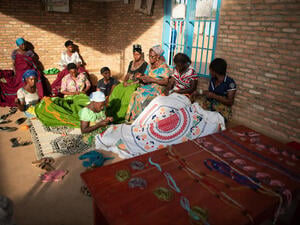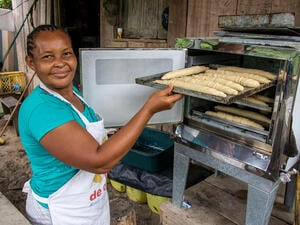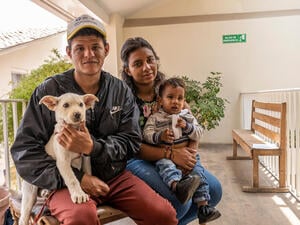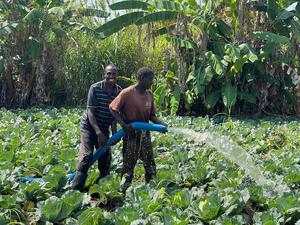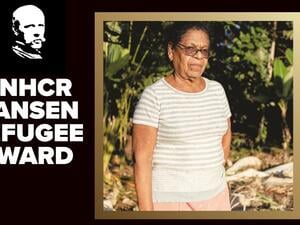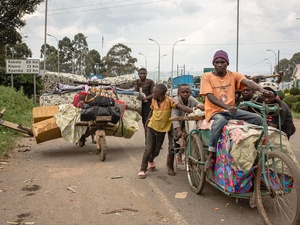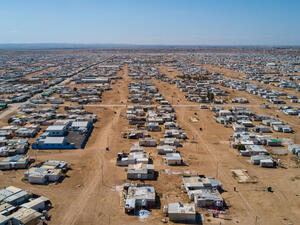Make refugees part of benchmarks for Africa's development, say panelists
Make refugees part of benchmarks for Africa's development, say panelists

Self-reliance activities at Tanzania's Kasulu camp show that refugees have much to contribute to Africa's development.
GENEVA, October 4 (UNHCR) - Delegates at an annual UNHCR meeting have called for the inclusion of humanitarian issues - including refugees and returnees - in a list of benchmarks for evaluating reforms and progress made by countries collaborating with the New Partnership for Africa's Development (NEPAD).
Meeting at a plenary session of UNHCR's Executive Committee in Geneva on Wednesday, the speakers also urged the UN refugee agency to "energetically influence" the proposed NEPAD peer review mechanism being set up, as a way of moving forward the agenda for refugees and returnees within the NEPAD framework.
The peer review mechanism, although not yet approved by NEPAD member countries, is expected to provide a structure through which African leaders themselves will evaluate reforms and progress made by their peers, i.e. heads of states, to improve the political and socio-economic situation in their countries. When agreed, leaders will be rated against a defined set of yardsticks and measurable indicators.
"UNHCR should energetically influence the peer review mechanism to ensure that refugees are included as a measurable indicator within the set of benchmarks," said panelist Haiko Alfeld of the World Economic Forum. "There should be transparent standards of protection set for inclusion in the peer review."
UN High Commissioner for Refugees Ruud Lubbers backed the delegates' call, saying it was a positive proposal that could push forward the search for durable solutions to the refugee problem. At the same time, he noted the need for added effort in addressing the root causes of refugee problems. The culture of impunity and greed continued to be fundamental problems in Africa that needed to be resolved, he added.
"Greed is a vice, not just in Africa, although in Africa it is too easy for people to get away with it. It is fuelled by the outside world and has its consequences. The culture of impunity is also still there. People can get away with exploiting others. These are some of the root causes of the refugee problem," said Lubbers.
The High Commissioner told governments that although refugees and returnees had not been included explicitly in the original NEPAD document, UNHCR was satisfied that refugee issues could be tackled under the peace and security component of the plan of action, which he described as "the essence of NEPAD".
However, he cautioned that unless the problem of population displacement was addressed, the goal of peace and security - a precondition to sustainable development in Africa - would not be achieved.
Out of the 20 million people of concern to UNHCR around the world, six million are to be found in Africa. Three million of them are refugees, while the rest are internally displaced persons and returnees.
Renewing his call to governments to include refugees in their national development plans, Lubbers warned, "If you do not include them, then you are on the wrong track," and lauded the Zambian government for an initiative started in western Zambia in 2001 to bridge the gap between relief and development.
Under the "Zambia Initiative", projects in the field of agriculture, health, education and physical infrastructure have been started to benefit both refugees and local populations, and to diffuse tensions between the two communities.
"Zambia deserves to be supported," said Lubbers, calling on donor countries to give more support to countries that are taking measures to integrate refugees into their development programmes.
Responding to calls for more support to countries hosting large numbers of refugees, panelist Ian Ferguson, Minister and Deputy Permanent Representative of Canada to the United Nations Office at Geneva, said, "Where results are demonstrated, more resources will follow."
A number of African governments urged the UN refugee agency to make more effort to translate NEPAD's commitment to refugees, under the peace and security objective of the plan of action, into concrete action on the ground. They also recommended the formation of a working group to outline the next course of action.
Speaking for the United Nations Economic Commission for Africa (ECA), panel member Lalla Ben Barka urged UNHCR to resist the "temptation to go it alone" and called for more co-ordination with other UN bodies.
There were also calls for more patience with the NEPAD process, which was described as "a work in progress".


